Local
Marriage and more
A look at the top 10 local news stories of 2013
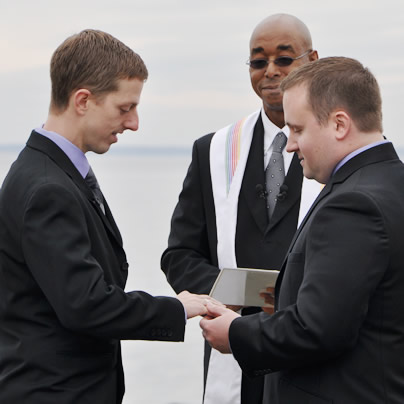
The momentous events of 2013 hit close to home, as marriage equality arrived in Maryland and Delaware. But last year wasn’t all about marriage. It was a big year for Democrats in Virginia and a lesbian lawmaker announced a bid for Maryland governor.
Here’s a look at the top 10 local news stories of 2013 as chosen by Blade editorial staffers.
#1 Marriage equality comes to Md., Del.
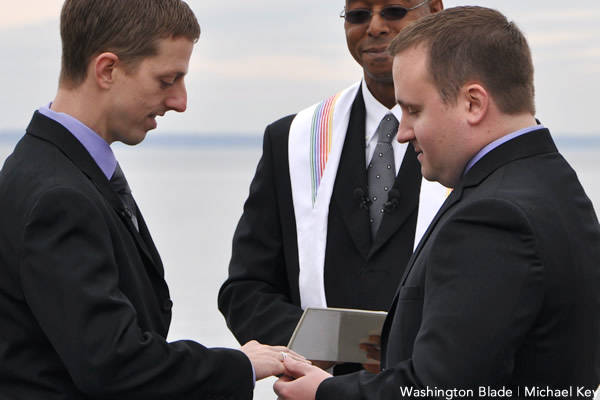
Marriage equality expanded throughout the mid-Atlantic in 2013 with Maryland and Delaware joining D.C. in allowing same-sex couples to wed. Clayton Zook and Wayne MacKenzie tied the knot on New Year’s Day on Tilghman Island. (Washington Blade photo by Michael Key)
Maryland and Delaware were among the states in which same-sex couples began to legally marry in 2013.
Seven same-sex couples married at Baltimore City Hall on Jan. 1 shortly after Maryland’s same-sex marriage law took effect in a ceremony that Baltimore Mayor Stephanie Rawlings-Blake officiated. They include long-time mayoral aide James Scales and his partner, William Tasker.
“New Year’s Day will have a new meaning for the hundreds — if not thousands — of couples who will finally have the right to marry the person they love,” said Rawlings-Blake.
More than half a dozen same-sex couples exchanged vows at the Black Walnut Point Inn on Tilghman Island in Talbot County on Jan. 1. These include innkeepers Tracy Staples and Bob Zuber who tied the knot almost immediately after the law took effect at midnight.
“I’m very proud of Maryland,” Michelle Miller of Stevensville in Queen Anne’s County told the Washington Blade on Jan. 1 after she married Nora Clouse at the Black Walnut Point Inn.
Delaware Gov. Jack Markell on May 7 signed his state’s same-sex marriage bill into law.
State Sen. Karen Peterson (D-Stanton) came out as a lesbian on the floor of the state Senate while she and her colleagues debated the measure. The New Castle County Democrat and her partner of more than 20 years, Vikki Bandy, on July 1 became the state’s first legally married same-sex couple when the couple converted their civil union into a marriage during a ceremony that New Castle County Clerk of the Peace Ken Boulden officiated.
“It’s exciting, both historically and personally,” Peterson told reporters after she and Bandy exchanged vows inside the New Castle County Clerk of the Peace’s office in Wilmington. “I never thought in our lifetimes we would be getting married.”
Boulden later on July 1 also officiated Joseph Daigle, II, and Daniel Cote’s wedding in Wilmington that Attorney General Beau Biden, New Castle County Executive Tom Gordon and other local and state officials attended.
“Today we are witnesses to a historic event for Delaware and for our community and quite frankly our future,” said Biden.
Delaware Family Policy Council President Nicole Theis and Rev. Leonard Klein of the Diocese of Wilmington are among those who testified against the same-sex marriage bill. Members of the Westboro Baptist Church on July 1 protested the law outside the New Castle County Clerk of the Peace’s office in Wilmington and at other locations throughout the state.
State Rep. Mike Ramone (R-Middle Run Valley) is the only Republican lawmaker who co-sponsored the measure. John Fluharty, executive director of the Delaware Republican Party, on March 15 came out during an exclusive interview with the Blade at an Equality Delaware fundraiser in Wilmington.
“I’m here this evening because I support marriage equality,” said Fluharty. “It’s an issue that’s of personal importance for me as a gay man.”
#2 McAuliffe elected Va. governor
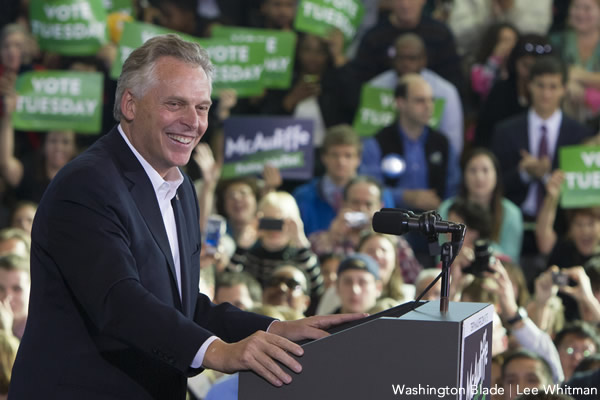
Terry McAuliffe is Virginia’s next governor after a campaign that prominently featured gay issues. (Washington Blade photo by Lee Whitman)
Former Democratic National Committee Chair Terry McAuliffe on Nov. 6 defeated Virginia Attorney General Ken Cuccinelli in the commonwealth’s gubernatorial race.
McAuliffe has repeatedly said his first executive order as governor will be to ban discrimination against LGBT state employees. The former DNC chair in February also endorsed marriage rights for same-sex couples.
State Sen. Ralph Northam (D-Norfolk) easily defeated Chesapeake minister E.W. Jackson in the state’s lieutenant gubernatorial race. The State Board of Elections on Nov. 25 officially certified state Sen. Mark Herring (D-Loudoun County) as the winner of the race to succeed Cuccinelli as attorney general, but state Sen. Mark Obenshain (R-Harrisonburg) requested a recount because he lost to his Democratic rival by only 165 votes.
Cuccinelli highlighted his opposition to marriage rights for same-sex couples during two debates against McAuliffe that took place in Hot Springs and McLean in July and September respectively. LGBT rights advocates also blasted the outgoing attorney general for appealing a federal appellate court’s March ruling that found Virginia’s sodomy law unconstitutional.
Jackson faced persistent criticism during the campaign over his previous comments that equated gay men to pedophiles and “very sick people.”
“Without exception, the Democratic candidates for statewide office offered unflinching support for marriage equality, a welcoming business climate and respect for a woman’s right to choose,” said gay state Sen. Adam Ebbin (D-Alexandria) after the election. “The people of Virginia aligned themselves with McAuliffe’s and Northam’s vision of an inclusive, forward moving commonwealth.”
#3 Va. lawmakers confirm gay judge
Virginia lawmakers on Jan. 15 confirmed gay Richmond Circuit Court Judge Tracy Thorne-Begland’s judgeship.
The Virginia House of Delegates in May 2012 blocked the former prosecutor’s nomination to the Richmond General Court after state Del. Bob Marshall (R-Prince William County) alleged he misrepresented himself when he failed to disclose his sexual orientation when he enlisted in the U.S. Navy in the late 1980s.
Thorne-Begland in 1992 publicly discussed his sexual orientation during an interview on ABC’s “Nightline.” He unsuccessfully challenged his discharge from the U.S. Navy under the Pentagon’s “Don’t Ask, Don’t Tell” policy then-President Bill Clinton signed into law in 1993.
Thorne-Begland is also a former Equality Virginia board member.
“Equality Virginia is pleased that the House of Delegates could see that Thorne-Begland is a qualified candidate with integrity and a long history of public service,” said Equality Virginia Executive Director James Parrish in a statement after lawmakers approved Thorne-Begland’s judgeship. “Thorne-Begland has served his country and his city with honor and unquestioned competence first as a Navy pilot and then as a prosecutor.”
Thorne-Begland is Virginia’s first openly gay judge.
#4 10 percent of D.C. residents are gay: report
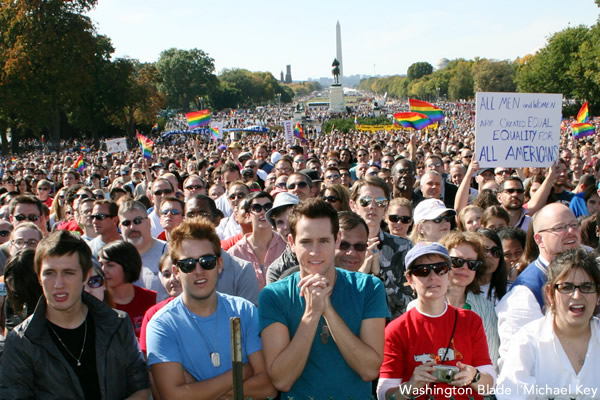
Gallup says that 10 percent of D.C. residents are gay. (Washington Blade file photo by Michael Key)
A report released in February by the Gallup polling organization showed that the District of Columbia has the highest percentage of self-identified LGBT residents in the nation in comparison to the 50 states.
Ten percent of 493 D.C. residents who responded to Gallup’s daily tracking polls between June 1 and Dec. 30, 2012 identified themselves as lesbian, gay, bisexual or transgender, according to the report. By comparison, 3.3 percent of a sample of 4,195 Maryland residents and 2.9 percent of a sample of 6,323 Virginians identified themselves as LGBT.
The report did not compare D.C. to other cities. Gary Gates of the Williams Institute at the UCLA School of Law, which studies LGBT related demographics, told the Blade the Gallop statistics appeared to be a more accurate snapshot of the country’s LGBT population than previous studies.
#5 Mizeur runs for governor in Md.
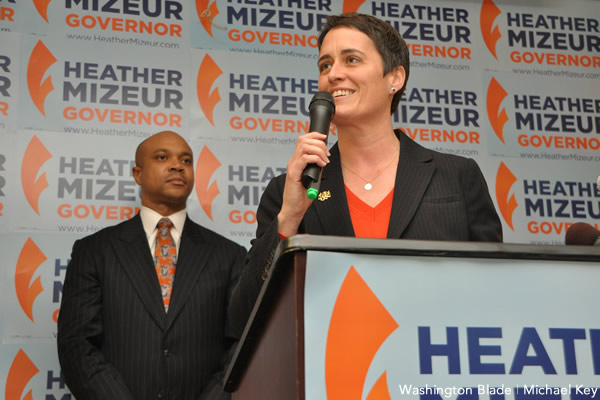
Del. Heather Mizeur is seeking to succeed Gov. Martin O’Malley. (Washington Blade file photo by Michael Key)
Maryland state Del. Heather Mizeur (D-Montgomery County) on July 16 officially entered the 2014 gubernatorial campaign.
“I’m running for governor because I love this state and I see limitless possibilities on what we can accomplish together,” the Montgomery County Democrat told the Washington Blade before she announced her candidacy. “There are great challenges facing us and also incredible opportunities.”
Mizeur last month raised eyebrows when she tapped Rev. Delman Coates of Mount Ennon Baptist Church in Clinton as her running mate. The Prince George’s County pastor in 2012 emerged as one of the most prominent supporters of Maryland’s same-sex marriage law that voters approved in a referendum.
“I have stood up for justice,” said Coates at a Nov. 14 campaign event during which Mizeur officially introduced him as her running mate. “I stand before you today not driven by professional or personal ambition, but by a calling to bring hope to others when they need it the most.”
Mizeur will face Lt. Gov. Anthony Brown and Attorney General Doug Gansler in the state Democratic primary in June. She could become the country’s first openly gay governor if Maryland voters elect her to succeed Martin O’Malley.
“Diversity is enormously important,” Mizeur told the Blade in July. “Not simply to have a gay governor, but to have a governor who can represent the voices of people in communities that have not always had a voice in the process.”
#6 Rash of violent incidents in June

Drag performer Miles Denaro was beaten and dragged by the hair by two women at the Manny & Olga’s pizzeria in June. (Screen capture)
Four transgender women, a gay man dressed in drag, and a lesbian were victims of separate violent attacks, including a murder, during the last two weeks of June, prompting LGBT activists to call a “community response” meeting to address the incidents.
Lesbian Malika Stover, 35, of Southeast D.C., was shot to death on June 22 following what police said was an argument with a neighbor that did not appear to be linked to her sexual orientation.
But transgender activist Earline Budd, who organized the meeting, said Stover’s slaying stunned people in the LGBT community who knew her.
“This is really putting all of us on edge,” she said. “You’re seeing all of these incidents happening in such a short period of time.”
Police arrested a 23-year-old male suspect for allegedly stabbing transgender woman Bree Wallace, 29, multiple times on June 21 in an abandoned house in Southeast D.C. Police said the incident stemmed from a dispute and did not appear to be a hate crime. In another incident on June 23, gay male drag performer Miles Denaro was beaten and dragged by the hair by two women at the Manny & Olga’s pizzeria near 14th and U streets, N.W. in an incident that was captured on video and posted on the Internet. The two women were arrested and pleaded guilty to a charge simple assault.
#7 Trans birth certificate bill hailed
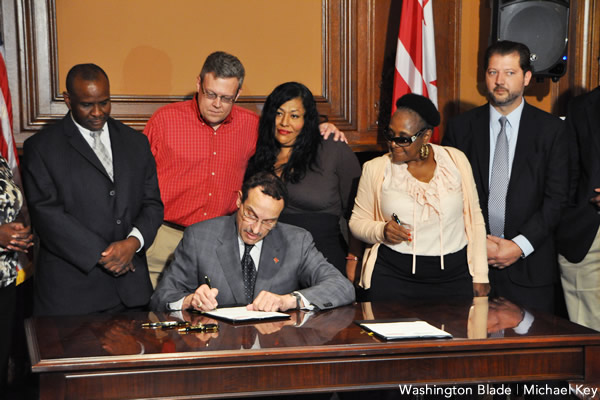
D.C. Mayor Vincent Gray signed a bill in August enabling trans people to change their birth certificates. (Washington Blade photo by Michael Key)
A bill signed into law by D.C. Mayor Vincent Gray in August that removes obstacles to the process of enabling transgender people to change their birth certificates to reflect their new gender has been hailed as a groundbreaking measure.
Among other things, the new law repealed a provision in an existing law that required transgender individuals to undergo gender reassignment surgery as a condition for obtaining a new birth certificate. Transgender advocates said the surgery was too expensive for many people and medically hazardous to others.
The new law is named the JaParker Deoni Jones Birth Certificate Equality Amendment Act of 2013 in honor of a transgender woman murdered near her home in 2012.
Another key provision in the law requires the D.C. Registrar to issue a new birth certificate designating a new gender for “any individual who provides a written request and a signed statement from a licensed healthcare provider that the individual has undergone a gender transition.”
#8 T.H.E. declares bankruptcy
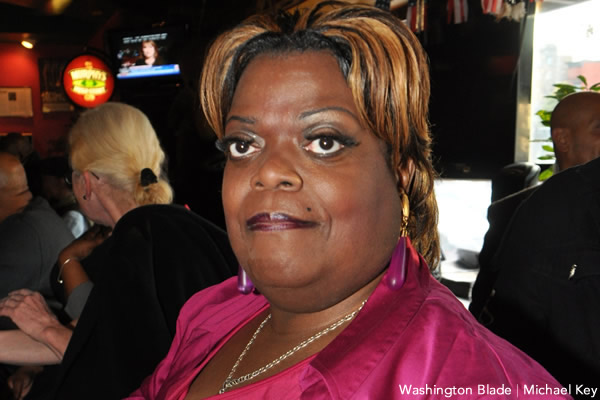
Earline Budd called on the city to investigate T.H.E.’s management practices. (Washington Blade file photo by Michael Key)
Transgender Health Empowerment, D.C.’s leading transgender services and advocacy organization for nearly 10 years, declared Chapter 11 bankruptcy on July 7. A short time later it discontinued all of its transgender-related programs.
The bankruptcy filing came after the D.C. Department of Health abruptly cut off its funding for T.H.E. when it learned that the IRS placed liens on the organization for its failure to pay more than $260,000 in employee withholding taxes over a period of at least three years. The bankruptcy filing shows that T.H.E.’s total debt comes to more than $560,000.
During a bankruptcy trustee’s hearing in August, T.H.E. executive director Anthony Hall said the group’s only source of income at the time of the hearing was a city grant calling for the organization to operate a non-LGBT related temporary housing facility for crime victims.
Longtime transgender activist Earline Budd, a former T.H.E. employee and one of its founders, has called on the city to investigate the group’s management practices to determine the cause of its financial problems.
#9 Mautner merges with Whitman-Walker
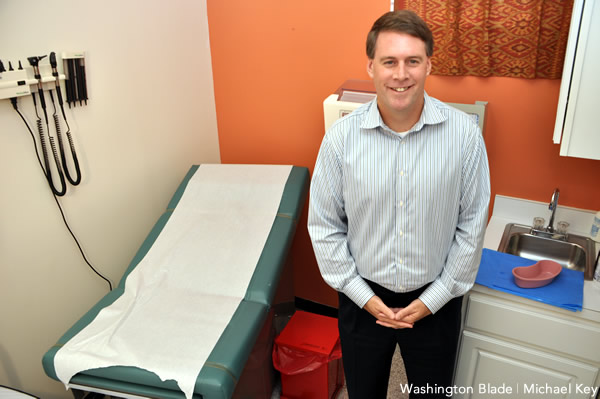
Whitman-Walker CEO Don Blanchon said Whitman-Walker had been looking for ways to expand its services to women. (Washington Blade file photo by Michael Key)
The Mautner Project, a national lesbian health organization based in Washington, D.C. since its founding in 1990, became an arm of D.C.’s Whitman-Walker Health in 2013 in what leaders of both groups called an “historic collaboration.”
In a joint statement released in June, the two organizations said the arrangement would bring the Mautner Project’s programs and staff under the “umbrella” of Whitman-Walker, an LGBT community health care provider founded in 1978.
Leslie Calman, Mautner Project’s executive director at the time the merger was announced, said the joining of the two groups would allow Mautner to “offer more critical services to a greater number of women who need those services throughout the region. It’s a natural fit.”
Whitman-Walker CEO Don Blanchon said Whitman-Walker had been looking for ways to expand its services to women. He said the Mautner Project’s “programs and reach within their community will help us fulfill that mission.”
Calman said that in addition to continuing its services for lesbians with serious illnesses such as cancer, the Mautner programs at Whitman-Walker would also continue various illness prevention programs such as cancer screening, smoking cessation and obesity reduction.
#10 Carson steps down as Hopkins speaker
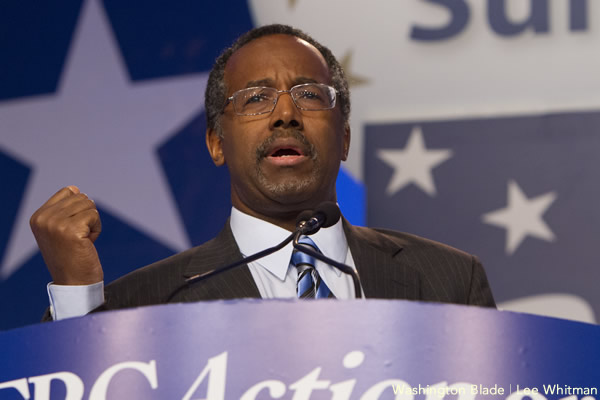
Ben Carson compared LGBT activism to bestiality and pedophilia. (Washington Blade photo by Lee Whitman).
A rising star in the Republican Party stirred controversy by comparing LGBT activism to bestiality and pedophilia, leading him to give up his role as commencement speaker at John Hopkins University.
The former neurosurgeon at Johns Hopkins made the remarks during an appearance on Fox News’ Sean Hannity when expressing his opposition to legalizing same-sex marriage.
“And no group, be they gays, be they NAMBLA (North American Man/Boy Love Association,) be they people who believe in bestiality — it doesn’t matter what they are — they don’t get to change the definition” of marriage, Carson said.
Carson’s remarks invoked the ire of students at John Hopkins University, where he was selected to speak as commencement speaker. The organization Media Matters asserted a majority of the graduating class, or around 700 students, called for his ouster. Although sources initially said Carson wouldn’t relinquish his speaking role at commencement, Carson eventually indicated he would acquiesce to students’ desires and step down as speaker.
But Carson went on to other public appearances, including one later in the year at a venue closer in tune with his views. Carson was among the speakers the anti-gay Family Research Council’s Values Voter Summit, where he articulated his opposition to marriage equality.
“We need to recognize that God created the family structure for a reason and marriage is a sacred institution from God himself, and there is no reason that man needs to change the definition of marriage,” Carson said.
District of Columbia
Catching up with the asexuals and aromantics of D.C.
Exploring identity and finding community

There was enough commotion in the sky at the Blossom Kite Festival that bees might have been pollinating the Washington Monument. I despaired of quickly finding the Asexuals and Aromantics of the Mid-Atlantic—I couldn’t make out a single asexual flag among the kites up above. I thought to myself that if it had been the Homosexuals of the Mid-Atlantic I would’ve had my gaydar to rely on. Was there even such a thing as ace-dar?
As it turned out, the asexual kite the group had meant to fly was a little too pesky to pilot. “Have you ever used a stunt kite?” Bonnie, the event organizer asked me. “I bought one. It looked really cool. But I can’t make it work.” She sighed. “I can’t get the thing six feet off the ground.” The group hardly seemed to care. There was caramel popcorn and cookies, board games and head massages, a game of charades with more than its fair share of Pokémon. The kites up above might as well have been a coincidental sideshow. Nearly two dozen folks filtered in and out of the picnic throughout the course of the day.
But I counted myself lucky that Bonnie picked me out of the crowd. If there’s such a thing as ace-dar, it eludes asexuals too. The online forum for all matters asexual, AVEN, or the Asexual Visibility and Education Network, is filled with laments: “I don’t think it’s possible.” “Dude, I wish I had an ace-dar.” “If it exists, I don’t have it.” “I think this is just like a broken clock is right twice a day type thing.” What seems to be a more common experience is meeting someone you just click with—only to find out later that they’re asexual. A few of the folks I met described how close childhood friends of theirs likewise came out in adulthood, a phenomenon that will be familiar to many queer people. But it is all the more astounding for asexuals to find each other this way, given that asexual people constitute 1.7% of sexual minorities in America, and so merely .1% of the population at large.
To help other asexuals identify you out in the world, some folks wear a black ring on their middle finger, much as an earring on the right ear used to signify homosexuality in a less welcoming era. The only problem? The swinger community—with its definite non-asexuality—has also adopted the signal. “It’s still a thing,” said Emily Karp. “So some people wear their ace rings just to the ace meet-ups.” Karp has been the primary coordinator for the Asexuals and Aromantics of the Mid-Atlantic (AAMA) since 2021, and a member of the meet-up for a decade. She clicked with the group immediately. After showing up for a Fourth of July potluck in the mid-afternoon, she ended up staying past midnight. “We played Cards against Humanity, which was a very, very fun thing to do. It’s funny in a way that’s different than if we were playing with people that weren’t ace. Some of the cards are implying, like, the person would be motivated by sex in a way that’s absurd, because we know they aren’t.”
Where so many social organizations withered during the pandemic, the AAMA flourished. Today, it boasts almost 2,000 members on meetup.com. Karp hypothesized that all the social isolation gave people copious time to reflect on themselves, and that the ease of meeting up online made it convenient as a way for people to explore their sexual identity and find community. Online events continue to make up about a third of the group’s meet-ups. The format allows people to participate who live farther out from D.C. And it allows people to participate at their preferred level of comfort: while many people participate much as they would at an in-person event, some prefer to watch anonymously, video feed off. Others prefer to participate in the chat box, though not in spoken conversation.
A recent online event was organized for a discussion of Rhaina Cohen’s book, “The Other Significant Others,” published in February. Cohen’s book discusses friendship as an alternative model for “significant others,” apart from the romantic model that is presupposed to be both the center and goal of people’s lives. The AAMA group received the book with enthusiasm. “It literally re-wired my brain,” as one person put it. People discussed the importance of friendship to their lives, and their difficulties in a world that de-prioritized friendship. “I can break up with a friend over text, and we don’t owe each other a conversation,” one said. But there was some disagreement when it came to the book’s discussion of romantic relationships. “It relegates ace relationships to the ‘friend’ or ‘platonic’ category, to the normie-reader,” one person wrote in the chat. “Our whole ace point is that we can have equivalent life relationships to allo people, simply without sex.” (“Allo” is shorthand for allosexual or alloromantic, people who do experience sexual or romantic attraction.)
The folks of the AAMA do not share a consensus on the importance of romantic relationships to their lives. Some asexuals identify as aromantic, some don’t. And some aromantics don’t identify as asexual, either. The “Aromantic” in the title of the group is a relatively recent addition. In 2017, the group underwent a number of big changes. The group was marching for the first time in D.C. Pride, participating in the LGBTQ Creating Change conference, and developing a separate advocacy and activism arm. Moreover, the group had become large enough that discussions were opened up into forming separate chapters for D.C., Central Virginia, and Baltimore. During those discussions, the group leadership realized that aromantic people who also identified as allosexual didn’t really have a space to call their own. “We were thinking it would be good to probably change the name of the Meetup group,” Emily said. “But we were not 100% sure. Because [there were] like 1,000 people in the group, and they’re all aces, and it’s like, ‘Do you really want to add a non-ace person?’” The group leadership decided to err on the side of inclusion. “You know, being less gatekeep-y was better. It gave them a place to go — because there was nowhere else to go.”
The DC LGBT Center now sponsors a support group for both asexuals and aromantics, but it was formed just a short while ago, in 2022. The founder of the group originally sought out the center’s bisexual support group, since they didn’t have any resources for ace folks. “The organizer said, you know what, why don’t we just start an ace/aro group? Like, why don’t we just do it?” He laughed. “I was impressed with the turnout, the first call. It’s almost like we tapped into, like, a dam. You poke a hole in the dam, and the water just rushes out.” The group has a great deal of overlap with the AAMA, but it is often a person’s first point of contact with the asexual and aromantic community in D.C., especially since the group focuses on exploring what it means to be asexual. Someone new shows up at almost every meeting. “And I’m so grateful that I did,” one member said. “I kind of showed up and just trauma dumped, and everyone was really supportive.”
Since the ace and aro community is so small, even within the broader queer community, ace and aro folks often go unrecognized. To the chagrin of many, the White House will write up fact sheets about the LGBTQI+ community, which is odd, given that when the “I” is added to the acronym, the “A” is usually added too. OKCupid has 22 genders and 12 orientations on its dating website, but “aromantic” is not one of them — presumably because aromantic people don’t want anything out of dating. And since asexuality and aromanticism are defined by the absence of things, it can seem to others like ace and aro people are ‘missing something.’ One member of the LGBT center support group had an interesting response. “The space is filled by… whatever else!” they said. “We’re not doing a relationship ‘without that thing.’ We’re doing a full scale relationship — as it makes sense to us.”
CJ Higgins is a postdoctoral fellow with the Alexander Grass Humanities Institute at Johns Hopkins University.
District of Columbia
Bowser budget proposal calls for $5.25 million for 2025 World Pride
AIDS office among agencies facing cuts due to revenue shortfall

D.C. Mayor Muriel Bowser’s proposed fiscal year 2025 budget includes a request for $5.25 million in funding to support the June 2025 World Pride celebration, which D.C. will host, and which is expected to bring three million or more visitors to the city.
The mayor’s proposed budget, which she presented to the D.C. Council for approval earlier this month, also calls for a 7.6 percent increase in funding for the Mayor’s Office of LGBTQ Affairs, which amounts to an increase of $132,000 and would bring the office’s total funding to $1.7 million. The office, among other things, provides grants to local organizations that provide services to the LGBTQ community.
Among the other LGBTQ-related funding requests in the mayor’s proposed budget is a call to continue the annual funding of $600,000 to provide workforce development services for transgender and gender non-conforming city residents “experiencing homelessness and housing instability.” The budget proposal also calls for a separate allocation of $600,000 in new funding to support a new Advanced Technical Center at the Whitman-Walker Health’s Max Robinson Center in Ward 8.
Among the city agencies facing funding cuts under the mayor’s proposed budget is the HIV/AIDS, Hepatitis, Sexually Transmitted Disease, and Tuberculosis Administration, known as HAHSTA, which is an arm of the D.C. Department of Health. LGBTQ and AIDS activists have said HAHSTA plays an important role in the city’s HIV prevention and support services. Observers familiar with the agency have said it recently lost federal funding, which the city would have to decide whether to replace.
“We weren’t able to cover the loss of federal funds for HAHSTA with local funds,” Japer Bowles, director of the Mayor’s Office of LGBTQ Affairs, told the Washington Blade. “But we are working with partners to identify resources to fill those funding gaps,” Bowles said.
The total proposed budget of $21 billion that Bowser submitted to the D.C. Council includes about $500 million in proposed cuts in various city programs that the mayor said was needed to offset a projected $700 million loss in revenue due, among other things, to an end in pandemic era federal funding and commercial office vacancies also brought about by the post pandemic commercial property and office changes.
Bowser’s budget proposal also includes some tax increases limited to sales and business-related taxes, including an additional fee on hotel bookings to offset the expected revenue losses. The mayor said she chose not to propose an increase in income tax or property taxes.
Earlier this year, the D.C. LGBTQ+ Budget Coalition, which consists of several local LGBTQ advocacy organizations, submitted its own fiscal year 2025 budget proposal to both Bowser and the D.C. Council. In a 14-page letter the coalition outlined in detail a wide range of funding proposals, including housing support for LGBTQ youth and LGBTQ seniors; support for LGBTQ youth homeless services; workforce and employment services for transgender and gender non-conforming residents; and harm reduction centers to address the rise in drug overdose deaths.
Another one of the coalition’s proposals is $1.5 million in city funding for the completion of the D.C. Center for the LGBTQ Community’s new building, a former warehouse building in the city’s Shaw neighborhood that is undergoing a build out and renovation to accommodate the LGBTQ Center’s plans to move in later this year. The coalition’s budget proposal also calls for an additional $300,000 in “recurring” city funding for the LGBTQ Center in subsequent years “to support ongoing operational costs and programmatic initiatives.”
Bowles noted that Bowser authorized and approved a $1 million grant for the LGBTQ Center’s new building last year but was unable to provide additional funding requested by the budget coalition for the LGBTQ Center for fiscal year 2025.
“We’re still in this with them,” Bowles said. “We’re still looking and working with them to identify funding.”
The total amount of funding that the LGBTQ+ Budget Coalition listed in its letter to the mayor and Council associated with its requests for specific LGBTQ programs comes to $43.1 million.
Heidi Ellis, who serves as coordinator of the coalition, said the coalition succeeded in getting some of its proposals included in the mayor’s budget but couldn’t immediately provide specific amounts.
“There are a couple of areas I would argue we had wins,” Ellis told the Blade. “We were able to maintain funding across different housing services, specifically around youth services that affect folks like SMYAL and Wanda Alston.” She was referring to the LGBTQ youth services group SMYAL and the LGBTQ organization Wanda Alston Foundation, which provides housing for homeless LGBTQ youth.
“We were also able to secure funding for the transgender, gender non-conforming workforce program,” she said. “We also had funding for migrant services that we’ve been advocating for and some wins on language access,” said Ellis, referring to programs assisting LGBTQ people and others who are immigrants and aren’t fluent in speaking English.
Ellis said that although the coalition’s letter sent to the mayor and Council had funding proposals that totaled $43.1 million, she said the coalition used those numbers as examples for programs and policies that it believes would be highly beneficial to those in the LGBTQ community in need.
“I would say to distill it down to just we ask for $43 million or whatever, that’s not an accurate picture of what we’re asking for,” she said. “We’re asking for major investments around a few areas – housing, healthcare, language access. And for capital investments to make sure the D.C. Center can open,” she said. “It’s not like a narrative about the dollar amounts. It’s more like where we’re trying to go.”
The Blade couldn’t’ immediately determine how much of the coalition’s funding proposals are included in the Bowser budget. The mayor’s press secretary, Daniel Gleick, told the Blade in an email that those funding levels may not have been determined by city agencies.
“As for specific funding levels for programs that may impact the LGBTQ community, such as individual health programs through the Department of Health, it is too soon in the budget process to determine potential adjustments on individual programs run though city agencies,” Gleick said.
But Bowles said several of the programs funded in the mayor’s budget proposal that are not LGBTQ specific will be supportive of LGBTQ programs. Among them, he said, is the budget’s proposal for an increase of $350,000 in funding for senior villages operated by local nonprofit organizations that help support seniors. Asked if that type of program could help LGBTQ seniors, Bowles said, “Absolutely – that’s definitely a vehicle for LGBTQ senior services.”
He said among the programs the increased funding for the mayor’s LGBTQ Affairs office will support is its ongoing cultural competency training for D.C. government employees. He said he and other office staff members conduct the trainings about LGBTQ-related issues at city departments and agencies.
Bowser herself suggested during an April 19 press conference that local businesses, including LGBTQ businesses and organizations, could benefit from a newly launched city “Pop-Up Permit Program” that greatly shortens the time it takes to open a business in vacant storefront buildings in the downtown area.
Bowser and Nina Albert, D.C. Deputy Mayor for Planning and Economic Development, suggested the new expedited city program for approving permits to open shops and small businesses in vacant storefront spaces could come into play next year when D.C. hosts World Pride, one of the word’s largest LGBTQ events.
“While we know that all special events are important, there is an especially big one coming to Washington, D.C. next year,” Bowser said at the press conference. “And to that point, we proposed a $5.25 million investment to support World Pride 2025,” she said, adding, “It’s going to be pretty great. And so, we’re already thinking about how we can include D.C. entrepreneurs, how we’re going to include artists, how we’re going to celebrate across all eight wards of our city as well,” she said.
Among those attending the press conference were officials of D.C.’s Capital Pride Alliance, which will play a lead role in organizing World Pride 2025 events.
Maryland
Health care for Marylanders with HIV is facing huge cuts this summer
Providers poised to lose three-quarters of funding

BY MEREDITH COHN | By the end of June, health care providers in Maryland will lose nearly three-quarters of the funding they use to find and treat thousands of people with HIV.
Advocates and providers say they had been warned there would be less money by the Maryland Department of Health, but were stunned at the size of the drop — from about $17.9 million this fiscal year to $5.3 million the next. The deep cuts are less than three months away.
The rest of this article can be read on the Baltimore Banner’s website.
-

 State Department2 days ago
State Department2 days agoState Department releases annual human rights report
-

 Maryland4 days ago
Maryland4 days agoJoe Vogel campaign holds ‘Big Gay Canvass Kickoff’
-

 Politics3 days ago
Politics3 days agoSmithsonian staff concerned about future of LGBTQ programming amid GOP scrutiny
-

 The White House1 day ago
The White House1 day agoWhite House debuts action plan targeting pollutants in drinking water










